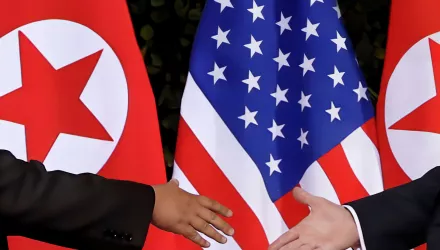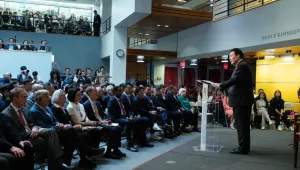Speaker Biographies
Ashley Chafin-Lomonosov is a Cybercrimes Investigator with Chainalysis, the blockchain data company that serves the public and private sectors globally in order to enable investigations and compliance in the crypto space. Prior to joining Chainalysis, Ashley served in the U.S. government. She leverages the past 10 years of developing financial threat intelligence analysis skills to investigate nation state activity on the blockchain. She specifically focuses on East Asian issues, spending the majority of her time studying DPRK’s tactics, techniques, and procedures on the blockchain. Ashley holds a Master’s in Business Administration and a Bachelor of Arts in Journalism & Public Relations.
Jenny Jun is a nonresident fellow at the Atlantic Council’s Cyber Statecraft Initiative and PhD Candidate at Columbia University’s Department of Political Science. Her research focuses on building a systematic logic of cyber coercion using formal models, identifying conditions under which certain cyber capabilities can or cannot be used to coerce adversaries. She is currently building a series of models on ransomware and the use of encryption for coercive effects. Jenny also conducts research on North Korea and security issues in East Asia. She is a co-author of the 2015 Center for Strategic and International Studies (CSIS) report North Korea’s Cyber Operations: Strategy and Responses, published by Rowman & Littlefield. She was a 2019 Summer Associate at RAND, where she conducted research on North Korea’s social media-based disinformation campaigns. Jenny received her MA and BS each from the Security Studies Program (SSP) and the School of Foreign Service (SFS) at Georgetown University. She has presented her work on North Korea’s cyber operations at the Brookings Institution, CSIS, and the School of International and Public Affairs (SIPA) at Columbia University, and has provided multiple government briefings and media interviews on the topic.
Heeu Millie Kim volunteers as the Director of Research for the North Korea Cyber Working Group, an initiative of the Belfer Center’s Korea Project. She recently obtained her Master of Science in Foreign Service (MSFS) from Georgetown University, where she also researched applications of artificial intelligence, cybersecurity, and information operations as a Graduate Research Analyst at the Center for Security and Emerging Technology. She has previously conducted research on North Korea and Indo-Pacific security at the Center for Strategic and International Studies (CSIS). Millie received her B.S. in International Politics and Mandarin Chinese from the School of Foreign Service at Georgetown University.
Seungmin “Helen” Lee conducts research with the Belfer Center’s North Korea Cyber Working Group and the Stimson Center’s 38 North Program. Her recent research focuses on the Korean Peninsula’s cyber power and the role of the U.S. in East Asia’s cyber conflicts. She recently published an op-ed with The Diplomat titled “The Future of South Korea-US Cyber Cooperation.” Previously, she was a research assistant at the Saltzman Institute of War and Peace Studies, specifically assisting Professor Jason Healey with cyber-related projects and initiatives, and has placed in the Cyber 9/12 Strategy Challenge twice. Helen is fluent in English, Korean, Spanish, and Japanese and is proficient in Chinese. She received a MIA from Columbia University’s School of International and Public Affairs in 2022 and a B.A. in Political Science from Columbia University in 2021.
June Lee is a consultant in the private sector and volunteers as co-lead of the Belfer Center’s North Korea Cyber Working Group. June’s research focuses on the law and policy surrounding cyber conflict, with a focus on the Indo-Pacific. She most recently co-authored a report through the Carnegie Endowment for International Peace on the dynamics underlying state attribution of cyber incidents and a Belfer Center report on North Korean cryptocurrency operations. June previously worked as a program coordinator and research assistant at the Carnegie Endowment’s Tech and International Affairs Program. She graduated Phi Beta Kappa from Stanford University with a B.A. in international relations, minor in computer science, and honors in international security studies.
Alex O’Neill is Coordinator of the Korea Project and an Associate at the Belfer Center for Science and International Affairs. He is also a Co-Founder of the Belfer Center’s North Korea Cyber Working Group. As Coordinator, Alex helps oversee all Korea Project events and initiatives, including the annual Harvard Korean Security Summit. He previously worked as Research Assistant to Prof. Matthew Bunn at the Belfer Center’s Project on Managing the Atom. Alex’s work focuses on North Korean financially motivated cyber operations, as well as links between North Korean and Russian-speaking criminals. His most recent research publication is “Cybercriminal Statecraft: North Korean Hackers’ Ties to the Global Underground.” Alex is a member of the Advisory Board of the International Refugee Assistance Project, the Visitors Committee of the American Bar Association International Law Section's October 2023 conference on "Law and the Future of Technology" in Seoul, and the Young Professionals Briefing Series at the Council on Foreign Relations. He speaks fluent Spanish and has advanced proficiency in Russian. Alex holds an M.Sc. in Russian and East European Studies from the University of Oxford and a B.A. in History from Yale University.
David Park is a Senior Policy Advisor in the U.S. Treasury Department’s Office of Terrorist Financing and Financial Crimes (TFFC). He advises senior leadership on policies and strategies that utilize Treasury’s tools to compete against China in the national security context, including in the technology, economy, and military spheres. He is also responsible for developing polices and strategies that seek to counter Chinese illicit financing, money laundering, financial crimes, corruption, and human rights abuses to advance U.S. national interests in the Indo-Pacific. Previously, David was the first U.S. Treasury Representative to Korea. While there, he advised U.S. government (USG) senior officials and agencies on North Korea sanctions, economy, and illicit financing and sought ways to work cooperatively with ROK institutions to enhance the USG’s pressure campaign on North Korea. Before his assignment to Korea, David was Senior Advisor to the Acting Assistant Secretary and Deputy Assistant Secretary (DAS) for TFFC, advising her on countering terrorist financing, proliferation financing, money laundering, corruption, and financial crimes issues. David began his Treasury career as a Policy Advisor, responsible for developing Treasury’s strategy and policy to counter North Korean illicit financing, financial crimes, and sanctions evasion. Before Treasury, David served in the Office of U.S. Senator Joe Donnelly as a Defense and Foreign Affairs Legislative Staffer. In this role, he advised the Senator on his Senate Armed Services Committee work and advanced U.S. national interests through the annual National Defense Authorization Act. David began his public service career as an officer in the U.S. Air Force. In the Air Force, he served with service members from all the service branches, the ROK Air Force in Korea, and NATO nations in Belgium. David earned his BA with honors from the University of California, Berkeley, MPA from the University of Oklahoma, and MA from The Fletcher School of Law and Diplomacy, Tufts University.
John Park is the Director of the Korea Project at the Harvard Kennedy School’s Belfer Center for Science and International Affairs. His core research projects focus on deterrence, economic statecraft, nuclear proliferation, Asian alliances, and North Korean cyber operations. At Harvard University, he is an Associated Faculty Member of the Korea Institute, Faculty Member of the Committee on Regional Studies East Asia, and a Faculty Affiliate with the Project on Managing the Atom. Dr. Park was the 2012-13 Stanton Nuclear Security Junior Faculty Fellow at MIT’s Security Studies Program. He also directed Northeast Asia Track 1.5 dialogues at the U.S. Institute of Peace in Washington, D.C. He advises Northeast Asia policy-focused officials in the U.S. government. Earlier, Dr. Park worked at Goldman Sachs and The Boston Consulting Group. He is a commentator on Asian geopolitical issues on CNN, BBC, CNBC, and Bloomberg TV. He also advises institutional investors on geopolitical risk in Asia-Pacific markets. Dr. Park’s key publications include: “Where Do Divergent U.S. and Chinese Approaches to Dealing with North Korea Lead?” in The China Questions II: Critical Insights into U.S.-China Relations (Harvard University Press, July 2022); “Micro Deterrence Signaling: Policy Innovation During the 2017 Korean Missile Crisis,” (Korea Project Report, Harvard Kennedy School, April 2022 – co-authored with General Vincent K. Brooks); “Stopping North Korea, Inc.: Sanctions Effectiveness and Unintended Consequences,” (MIT Security Studies Program, 2016 – co-authored with Dr. Jim Walsh); “The Key to the North Korean Targeted Sanctions Puzzle,” The Washington Quarterly (Fall 2014); “Assessing the Role of Security Assurances in Dealing with North Korea” in Security Assurances and Nuclear Nonproliferation (Stanford University Press, 2012); “North Korea, Inc.: Gaining Insights into North Korean Regime Stability from Recent Commercial Activities” (USIP Working Paper, May 2009); and “North Korea’s Nuclear Policy Behavior: Deterrence and Leverage,” in The Long Shadow: Nuclear Weapons and Security in 21st Century Asia (Stanford University Press, 2008). Dr. Park’s current research examines the North Korean regime’s accumulated learning in evading sanctions via cyber operations. He has testified on North Korea before the Senate Banking Committee, House Financial Services Committee, and House Foreign Affairs Committee. Dr. Park received his Ph.D. from the University of Cambridge. He completed his predoctoral and postdoctoral training at the Harvard Kennedy School’s Belfer Center.
Prashil Pattni is a Principal Threat Intelligence Analyst at BAE Systems Digital Intelligence. Prashil currently researches state-sponsored cyber espionage and financially motivated activity from high end cyber criminals to state sponsored threat groups, with a focus on North Korean activity. Prashil specialises in the tracking of Lazarus, having analysed numerous campaigns from the group over the past five years including their activity against SWIFT and ATM systems in the financial sector, the cryptocurrency sector, and their espionage efforts against the aerospace and defence sector. Prior to working at BAE Systems, Prashil graduated from the University of Nottingham with a Bachelor’s in Computer Science.
Jacquelyn Schneider is a Hoover Fellow at the Hoover Institution and an affiliate with Stanford's Center for International Security and Cooperation. Her research focuses on the intersection of technology, national security, and political psychology with a special interest in cybersecurity, autonomous technologies, wargames, and Northeast Asia. She is a non-resident fellow at the Naval War College's Cyber and Innovation Policy Institute and was previously a senior policy advisor to the Cyberspace Solarium Commission. Her scholarly work has appeared in a series of journals including European Journal of International Relations, Security Studies, Journal of Conflict Resolution, Strategic Studies Quarterly, Journal of Cybersecurity, The Washington Quarterly, Journal of Strategic Studies, Journal of Global Security Studies, Simulation and Gaming, PloS One and is featured in Cross Domain Deterrence: Strategy in an Era of Complexity (Oxford University Press, 2019). In addition to her scholarly publications, she is a frequent contributor to policy outlets, including New York Times, Wall Street Journal, Foreign Affairs, CNN, NPR, BBC, MSNBC, CFR, Wired, Cipher Brief, Lawfare, War on the Rocks, Washington Post, Bulletin of the Atomic Scientists, National Interest, H-Diplo, and the Center for a New American Security. Dr. Schneider was a 2020 winner of the Perry World House-Foreign Affairs Emerging Scholars Policy Prize. She is also the recipient of a Minerva grant on autonomy (with co-PIs Michael Horowitz, Julia Macdonald, and Allen Dafoe), a University of Denver grant to study public responses to the use of drones (with Macdonald), and a grant from the Stanton Foundation to study networks, cyber, and nuclear stability through wargames. Dr. Schneider is an active member of the defense policy community with previous positions at the Center for a New American Security and the RAND Corporation. Before beginning her academic career, she spent six years as an Air Force officer in South Korea and Japan and is currently a reservist assigned to US Space Systems Command. She has a BA from Columbia University, MA from Arizona State University, and PhD from George Washington University.
Ahyoung Shin is an Analyst at the Embassy of the Republic of Korea. She is also a member of the Belfer Center's North Korea Cyber Working Group. Her research interests are North Korean financially motivated cyber operations as well as the implications of AI for cyber from a national security perspective. She previously interned at the Center for Strategic and International Studies (CSIS), where her work focused on nuclear proliferation and U.S.-East Asia relations, and worked as a Research Assistant for the EU-Korea Center at Korea University. She also worked on a practicum project with the U.S. State Department as a Graduate Consultant on U.S.-Russia-China relations at American University. Ahyoung holds Master's degrees in U.S. Foreign Policy and National Security from American University and in International Peace and Security from Korea University and a B.A. in Political Science from Sookmyung Women's University in Korea.
Nigel Vinson is a former research assistant for the Technology and National Security Program at CNAS. His research interests focus on Australian foreign policy, U.S.-China competition, cybersecurity, human rights, the maintenance and modernization of U.S. alliance structures in the Indo-Pacific, including properly leveraging Indo-Pacific alliances to compete in the emerging technologies and digital space. Before joining CNAS he was an intern and researcher with the Reconnecting Asia Project at CSIS focusing on the digital aspects of China's BRI. During his undergraduate degree, he spent time working with former combatants of the Yugoslav war on a peace-building mission in Kosovo, Montenegro, and Albania, while also spending a summer in Hong Kong studying the economic and intellectual trends of 20th century China. Vinson is originally from Cleveland, Ohio and he received his B.A. in East Asian Studies along with a Mandarin proficiency certificate from Ohio University and his M.A. in International Relations from the University of Sydney in Australia.



